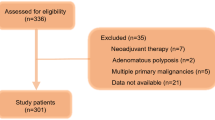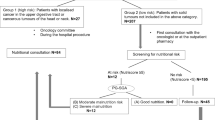Abstract
Background/objectives
The aim of this analysis was to determine the risk of malnutrition and the prognostic value of nutritional intervention in patients affected by pancreatic ductal adenocarcinoma (PDAC) undergoing chemotherapy.
Subjects/methods
Clinical–pathological and nutritional data were correlated with overall survival (OS) using a Cox model. Nutritional status was determined by Malnutrition Universal Screening Tool (MUST), body mass index, weight loss in the past 6 months, presence of nutrition-related symptoms, and current energy intake. Nutritional intervention included appropriate individual dietary counseling.
Results
Data from 109 patients were gathered (median age 63 years). The majority of patients (64.2%) presented a MUST value of ≥ 2, corresponding to a high risk of malnutrition. At multivariate analysis for OS in locally advanced and metastatic PDAC patients, the time between the diagnosis and the nutritional intervention (HR 2.22, p = 0.017), the performance status (HR 1.38, p = 0.075), the surgery of the primary (HR 5.89, p = 0.005), and the response to the first line (HR 5.9, p = 0.03) were independent significant predictors of outcome. Furthermore, a weight gain > 2% from the baseline weight was correlated with the time between the diagnosis and the nutritional intervention (p = 0.021): in patients receiving a nutritional support within 3 months from diagnosis, a 2% weight gain was associated with a 2-year OS benefit (50.3% vs. 33.0%, p = 0.04).
Conclusions
This analysis suggests that the early nutritional support may contribute to influence the prognosis of patients affected by advanced PDAC undergoing chemotherapy.
This is a preview of subscription content, access via your institution
Access options
Subscribe to this journal
Receive 12 print issues and online access
$259.00 per year
only $21.58 per issue
Buy this article
- Purchase on Springer Link
- Instant access to full article PDF
Prices may be subject to local taxes which are calculated during checkout



Similar content being viewed by others
References
Stan SD, Singh SV, Brand RE. Chemoprevention strategies for pancreatic cancer. Nat Rev Gastroenterol Hepatol. 2010;7:347–56.
Gilliland TM, Villafane-Ferriol N, Shah KP, Shah RM, Tran Cao HS, Massarweh NN, et al. Nutritional and metabolic derangements in pancreatic cancer and pancreatic resection. Nutrients. 2017; Mar 7; 9 (3) pii: E243.
Falconer JS, Fearon KC, Plester CE, Ross JA, Carter DC. Cytokines, the acute-phase response, and resting energy expenditure in cachectic patients with pancreatic cancer. Ann Surg. 1994;219:325–31.
Wigmore SJ, Todorov PT, Barber MD, Ross JA, Tisdale MJ, Fearon KC. Characteristics of patients with pancreatic cancer expressing a novel cancer cachectic factor. Br J Surg. 2000;87:53–8.
Bye A, Jordhoy MS, Skjegstad G, Ledsaak O, Iversen PO, Hjermstad MJ. Symptoms in advanced pancreatic cancer are of importance for energy intake. Support Care Cancer. 2013;21:219–27.
Gartner S, Kruger J, Aghdassi AA, Steveling A, Simon P, Lerch MM, et al. Nutrition in pancreatic cancer: a review. Gastrointest Tumors. 2016;2:195–202.
Terwee CB, Nieveen Van Dijkum EJ, Gouma DJ, Bakkevold KE, Klinkenbijl JH, Wade TP, et al. Pooling of prognostic studies in cancer of the pancreatic head and periampullary region: the Triple-P study. Triple-P study group. Eur J Surg. 2000;166:706–12.
Ferrone CR, Brennan MF, Gonen M, Coit DG, Fong Y, Chung S, et al. Pancreatic adenocarcinoma: the actual 5-year survivors. J Gastrointest Surg. 2008;12:701–6.
Vaisman N, Lusthaus M, Niv E, Santo E, Shacham-Shmueli E, Geva R, et al. Effect of tumor load on energy expenditure in patients with pancreatic cancer. Pancreas. 2012;41:230–2.
Arends J, Bachmann P, Baracos V, Barthelemy N, Bertz H, Bozzetti F, et al. ESPEN guidelines on nutrition in cancer patients. Clin Nutr. 2017;36:11–48.
Shuster JJ. Median follow-up in clinical trials. J Clin Oncol. 1991;9:191–2.
Harrell FE Jr., Lee KL, Califf RM, Pryor DB, Rosati RA. Regression modelling strategies for improved prognostic prediction. Stat Med. 1984;3:143–52.
Bozzetti F, Arends J, Lundholm K, Micklewright A, Zurcher G, Muscaritoli M, et al. ESPEN guidelines on parenteral nutrition: non-surgical oncology. Clin Nutr. 2009;28:445–54.
La Torre M, Ziparo V, Nigri G, Cavallini M, Balducci G, Ramacciato G. Malnutrition and pancreatic surgery: prevalence and outcomes. J Surg Oncol. 2013;107:702–8.
Wigmore SJ, Plester CE, Richardson RA, Fearon KC. Changes in nutritional status associated with unresectable pancreatic cancer. Br J Cancer. 1997;75:106–9.
Kanda M, Fujii T, Kodera Y, Nagai S, Takeda S, Nakao A. Nutritional predictors of postoperative outcome in pancreatic cancer. Br J Surg. 2011;98:268–74.
Ravasco P, Monteiro-Grillo I, Vidal PM, Camilo ME. Nutritional deterioration in cancer: the role of disease and diet. Clin Oncol. 2003;15:443–50.
Uomo G, Gallucci F, Rabitti PG. Anorexia-cachexia syndrome in pancreatic cancer: recent development in research and management. JOP. 2006;7:157–62.
Moses AW, Slater C, Preston T, Barber MD, Fearon KC. Reduced total energy expenditure and physical activity in cachectic patients with pancreatic cancer can be modulated by an energy and protein dense oral supplement enriched with n-3 fatty acids. Br J Cancer. 2004;90:996–1002.
Caccialanza R, Cereda E, Pinto C, Cotogni P, Farina G, Gavazzi C, et al. Awareness and consideration of malnutrition among oncologists: Insights from an exploratory survey. Nutrition. 2016;32:1028–32.
Bauer JD, Capra S. Nutrition intervention improves outcomes in patients with cancer cachexia receiving chemotherapy--a pilot study. Support Care Cancer. 2005;13:270–4.
Akahori T, Sho M, Tanaka T, Kinoshita S, Nagai M, Nishiwada S, et al. Factors associated with failure to complete adjuvant chemotherapy in pancreatic cancer. Am J Surg. 2016;211:787–92.
Pelzer U, Arnold D, Govercin M, Stieler J, Doerken B, Riess H, et al. Parenteral nutrition support for patients with pancreatic cancer. Results of a phase II study. BMC Cancer. 2010;10:86.
Davidson W, Ash S, Capra S, Bauer J, Cancer Cachexia Study G. Weight stabilisation is associated with improved survival duration and quality of life in unresectable pancreatic cancer. Clin Nutr. 2004;23:239–47.
Ramalho R, Ramalho P, Couto N, Pereira P. Omega-3 therapeutic supplementation in a patient with metastatic adenocarcinoma of the pancreas with muscle mass depletion. Eur J Clin Nutr. 2017;71:795–7.
Laviano A, Rianda S, Molfino A, Rossi Fanelli F. Omega-3 fatty acids in cancer. Curr Opin Clin Nutr Metab Care. 2013;16:156–61.
Paccagnella A, Morello M, Da Mosto MC, Baruffi C, Marcon ML, Gava A, et al. Early nutritional intervention improves treatment tolerance and outcomes in head and neck cancer patients undergoing concurrent chemoradiotherapy. Support Care Cancer. 2010;18:837–45.
Temel JS, Greer JA, Muzikansky A, Gallagher ER, Admane S, Jackson VA, et al. Early palliative care for patients with metastatic non-small-cell lung cancer. N Eng J Med. 2010;363:733–42.
Dev R, Wong A, Hui D, Bruera E. The evolving approach to management of cancer cachexia. Oncology. 2017;31:23–32.
Mueller TC, Burmeister MA, Bachmann J, Martignoni ME. Cachexia and pancreatic cancer: are there treatment options? World J Gastroenterol. 2014;20:9361–73.
Author information
Authors and Affiliations
Corresponding author
Ethics declarations
Ethics approval:
The study was approved by the local Ethics Committee (Prot. 1341 CESC).
Conflict of interest:
The authors declare that they have no conflict of interest.
Additional information
These authors contributed equally: Ilaria Trestini, Luisa Carbognin.
These authors contributed equally: Emilio Bria, Giampaolo Tortora.
Rights and permissions
About this article
Cite this article
Trestini, I., Carbognin, L., Sperduti, I. et al. Prognostic impact of early nutritional support in patients affected by locally advanced and metastatic pancreatic ductal adenocarcinoma undergoing chemotherapy. Eur J Clin Nutr 72, 772–779 (2018). https://doi.org/10.1038/s41430-018-0155-5
Received:
Revised:
Accepted:
Published:
Issue Date:
DOI: https://doi.org/10.1038/s41430-018-0155-5



